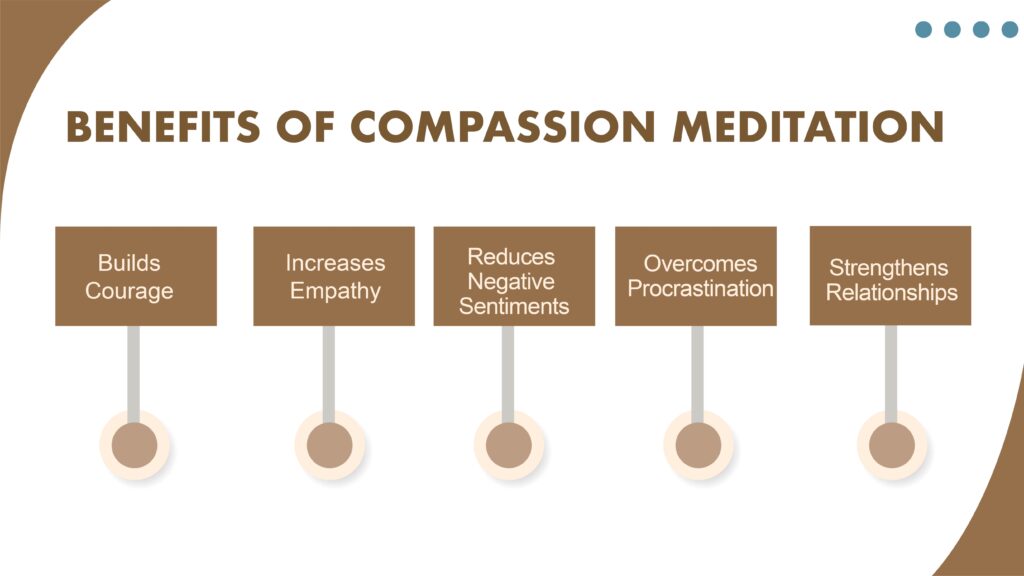Globally, self-criticism is increasing rapidly, paving way for unwanted thoughts. Overthinking, perfectionism, and lack of self-esteem are all its by-products. Usually, when these by-products are seen in a workplace, it is eminent that there would be problems of low productivity, and motivation. Similarly, when self-criticism is present at a personal level there are high chances of physical and mental disorders. According to a popular theory, self-criticism leads to depression, Social Anxiety Disorder, and feelings of insignificance (worthlessness).
Popular religious teachings tell us that with every disease there is a cure already present. Such is the case for self-criticism and that is compassion. When we instill compassion for ourselves, others and for people who we love, we can overcome such negative feelings. But how can one create compassion in oneself?
Simple, through compassion meditation.
Let's have a deeper understanding of this term.
Compassion and Its Pre-eminence
Human beings are wired to be interconnected. In better words, we are all interlinked like one big family. Undoubtedly, we have to show each other compassion, love and treat one another well. What we take we need to give back, and only the good ones. It is why positive feelings that are directed to others create a rippling effect. It is why we need more compassion in this world than criticism. Compassion is contagious and it can be cultivated through loving-kindness meditation too.
Compassion Meditation and Its Deeper Understanding
Meditation that cultivates compassion for ourselves, and for those we are surrounded with is known as compassion meditation. The idea is to meditate mindfully and decide on a focus point. It can be anything, from focusing on the breath or a fixed point. But while one does this, rising thoughts can disturb us and deviate us from our focus. These negative thoughts that are self-critical bring about emotional disasters which is why we need to bring back our focus to our focal point. Individuals during compassion meditation are asked to bring back their focus slowly and cultivate compassionate feelings. But, there is a high chance that compassion meditation experts have recently adopted affirmations. Individuals are asked to read affirmations to themselves whenever they are self-critical.
These allow the individual to replace criticism with care, and social avoidance with stronger and better bondings. Practically, meditation experts suggest meditating for at least 10 to 20 minutes a day to truly enjoy the essence of compassion meditation. It is also suggested that meditators stay consistent so that they can reap all the benefits of compassion meditation.
Scientific research on Compassion Meditation
A review published in 2022 instilled that compassion meditation is responsible for increasing positive sentiments and reducing negative sentiments. Along with this, CM reduces stress, anxiety, and depression while boosting empathy.
Another research is conducted in 2022 on employees regarding compassion meditation and loving-kindness meditation. The study concluded that employees were able to have altruism (selflessness for others). It also showed significant improvement in their behavior and had positive effects.

How Compassion Meditation lets us Make the Most of Our Life
Although there are several things that can be adopted in our life that can be adopted to make our lives better. But there are only some that produce sustainable results. Results that keep us driven, and motivated and improve the quality of our life. Compassion meditation is one of them, but let's look at how it actually makes a significant change.
- Mood Enhancement: Meditation changes the way we perceive things which ultimately affects how our body reacts to external factors. For instance, when we instill compassion, we might see the same situation from a different perspective. If we were going to be miserable after hearing bad news, we might now be more compassionate to ourselves. This compassionate feeling increases our chances of giving us time to heal inreturn letting us be happier when we couldn't have been.
- Altruism Enhancement: In some cultures, being altruistic is considered a virtue. It entails self-sacrifice for the benefit of others. A person's innate tendency to want to spread happiness is heightened when they actively seek to improve their own state of well-being. As a result, they try to assist others by offering guidance or listening sympathetically. A decrease in social isolation is one of the many advantages of altruism, as is an improved ability to see the larger picture. Finally, it aids in boosting one's sense of well-being.
- Reduced Negative sentiments: Negative sentiments can be alleviated It's simpler to deal with negative emotions when one has built up self-confidence via self-improvement and service to others. A person can be held back from moving forward by negative sentiments such as fear and rage. People aren't able to devote as much time as they'd like to improving themselves. As a result, mindfulness meditation with compassion reduces unpleasant feelings.
- Procrastination-busting strategies: Experts believe that procrastination is caused by unpleasant feelings. Having low self-esteem, a lack of accomplishment and a tendency to lose out on chances can have major ramifications for any individual. Compassion meditation gives you the tools you need to deal with difficult feelings. Because of this, people can reduce their procrastinating habits.
Stay In The Moment
When practicing meditation, one is encouraged to remain in the present moment with an emphasis on compassion. First and foremost, one should feel compassion for one's own shortcomings. "I am capable of handling life's obstacles," the user can declare out loud or inwardly, for example. "I'm happy with who I am," I say. The sentence can be repeated as many times as desired by the individual, with or without changes. Every person's self-critical side will try to oppose it. However, you should simply observe these unpleasant feelings and ideas, and not allow them to interfere with your meditation practice.
How Our Courses can help you achieve Compassion?
Compassionate mindfulness meditation begins with this stage. In this way, the practice's advantages can be multiplied. Compassion can be linked to one's breathing routine for those who practice it. Compassion goes in, and the criticism goes out (when inhaling deeply) (while breathing out). I find it to have a really relaxing effect on my thoughts, says a meditation expert.



